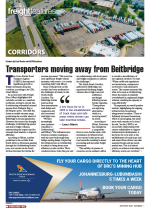Inadequate transport infrastructure on Africa’s trade corridors is both a threat and an opportunity, according to André Pottas, Deloitte corporate finance advisory leader for sub-Saharan Africa.The Infrastructure Consortium of Africa estimates that poor road, rail and harbour infrastructure adds 30-40% to the costs of goods traded between African countries.“It is estimated that about $93 billion is needed annually over the next decade to overhaul sub-Saharan African infrastructure,” writes Pottas. About two-thirds or $60bn of that is needed for new infrastructure and $30bn for maintenance. At present, only about $25bn annually is being spent on capital projects, leaving a substantial shortfall, he says. There is a potential upside to the infrastructure challenges. “While inadequate infrastructure may be the single biggest threat to Africa’s long-term growth, at the same time it represents a significant opportunity for investors to finance physical infrastructure assets such as ports, railway lines, toll roads, power stations, hospitals and broadband ICT.“Africa is at the start of a 20- to 30-year infrastructure development boom.” Researcher Gita Briel sees another positive: “Given that the continent is in the relatively early stages of cross-border infrastructure investment and planning and the current continental drive towards infrastructure development, notably by the Programme for Infrastructure Development in Africa (Pida), there is an opportunity to consider integrating environmental criteria into all stages of freight transport system development.”Other analysts point out that the success of the African Continental Free Trade Area (AfCFTA) common market will depend on improvements to transportation networks and logistics facilities, as well as regulatory frameworks.“Infrastructure deficiencies, inadequate transportation networks, and border facilities impede the implementation of the AfCFTA,” writes James Shikwati, the founder director, Inter Region Economic Network, Kenya, in his analysis of the progress being made with AfCFTA. “Addressing these shortcomings requires significant investment in infrastructure development, which remains a critical priority for the continent. “The AfCFTA should learn from its pre-slavery trade and investment networks and domesticate strategies from regions that learnt from their dismal past to build a productive present and future,” he warns in a Friedrich Naumann Foundation-sponsored st udy. ER

